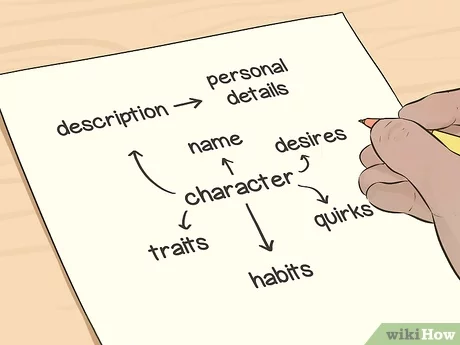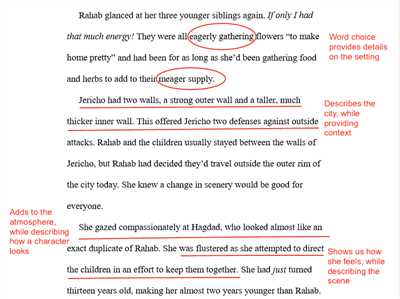
Writing lore for a story or a game can be an unveiled art. It requires an understanding of the elements that make a plot, the richness of the characters, and the specific instructions to create a captivating story. However, it is not as easy as it seems, as lore writers have to take a look-a-like approach to different genres and make their works unique.
For example, in the sci-fi genre, lore writers have to create a world with elements and anecdotes that are not the same as other stories. They have to write lore that doesn’t follow the same tropes and clichés as other sci-fi works. This can be a challenge, but with some tips and instructions, lore writers can create a lore that stands out.
Firstly, it is important to understand the genre and the specific length requirements for the lore. Some genres, like flash fiction or short stories, have a word limit that writers need to adhere to. However, in other genres like novels, lore can be more extensive. Understanding the genre and its specific requirements will help writers craft their lore effectively.
Secondly, lore writers should be able to create a world that is rich in details and has a cohesive structure. They should take into account the different elements of the story – the characters, the setting, and the plot – and weave them together seamlessly. This will make the lore more engaging and immersive for the readers or players.
Lastly, lore writers should always strive to make their lore unique. They should avoid using clichés and tired tropes, and instead, come up with fresh and innovative ideas. This will ensure that the lore stands out and captures the attention of the audience.
In conclusion, writing good lore is not an easy task. It requires an understanding of the genre, the ability to create unique and immersive worlds, and a knack for storytelling. By following these tips and instructions, lore writers can create captivating lore that adds depth and richness to their stories or games.
- How to Write a Short Story – 10 Good Tips for Writers
- 1. Take Inspiration from Real Life
- 2. Choose a Unique Plot
- 3. Understand the Genre
- 4. Create Memorable Characters
- 5. Make Every Word Count
- 6. Establish a Clear Tone and Voice
- 7. Structure the Story Effectively
- 8. Use Flashbacks Sparingly
- 9. Read and Study Short Stories
- 10. Revise and Edit
- Sci-fi story tropes
- Different types of stories
- Is an anecdote the same as a story?
- UnVale Mobile App Look-a-Like How It Works
- Video:
- How to create DEPTH in your writing (easy method to make your novels and stories more immersive!)
How to Write a Short Story – 10 Good Tips for Writers
Writing a short story can be challenging, but it’s also a great opportunity for writers to showcase their talent and creativity. Whether you’re an experienced writer or just starting out, these 10 tips will help you craft a compelling short story.
1. Take Inspiration from Real Life
Look around you – there are stories everywhere. Take a specific event, anecdote, or person from your own life or someone you know, and use it as a starting point for your story. By grounding your writing in real experiences, you can make it more relatable and engaging.
2. Choose a Unique Plot
A short story doesn’t have the length to support a complex or drawn-out plot. Instead, focus on a single, compelling idea or event. Think about what will grab the reader’s attention and keep them turning the pages.
3. Understand the Genre

Every genre has its own unique tropes and elements. Whether you’re writing sci-fi, fantasy, romance, or any other genre, familiarize yourself with the expectations and rules of that genre. This will help you craft a story that fits within its conventions while still being original.
4. Create Memorable Characters
Even in a short story, your characters should be well-developed and interesting. Give them distinct personalities, motives, and flaws that drive their actions. The reader should care about what happens to them and be invested in their journey.
5. Make Every Word Count
In a short story, every word matters. Cut out unnecessary details and focus on concise, impactful writing. Choose words carefully to convey meaning and create a vivid, immersive experience for the reader.
6. Establish a Clear Tone and Voice
Every story has a unique tone and voice, which sets the mood and atmosphere. Whether it’s light-hearted, dark, humorous, or serious, decide on the tone and maintain it throughout the story. This will help create a cohesive and engaging reading experience.
7. Structure the Story Effectively
A short story doesn’t have the length for extensive background information or lengthy descriptions. Start your story with a hook that grabs the reader’s attention, and then focus on the main events and conflict. Build tension and suspense, leading to a satisfying resolution.
8. Use Flashbacks Sparingly
While flashbacks can be a useful tool, they can disrupt the flow of a short story. Use them sparingly and only if they truly enhance the plot or character development. Too many flashbacks can confuse the reader and take away from the main story.
9. Read and Study Short Stories
Read a variety of short stories to understand how they work. Pay attention to the different techniques and styles that authors use. This will help you develop your own voice and understand what works in the short story form.
10. Revise and Edit
After you’ve written your first draft, take the time to revise and edit. Look for areas where the story could be strengthened or tightened. Remove any unnecessary or extraneous details. Get feedback from others and be open to making changes that improve the overall quality of the story.
By following these 10 tips, you’ll be well on your way to writing a compelling short story. Remember, a short story is not just a scaled-down version of a novel – it’s a unique form that requires its own set of skills and techniques. With practice and perseverance, you can create short stories that captivate and resonate with readers.
Sci-fi story tropes
Science fiction is a genre that allows writers to explore unique and imaginative ideas. However, it can be challenging to come up with a plot that stands out among the vast number of sci-fi stories. To make their sci-fi story stand out, writers can use specific tropes and elements that are commonly found in the genre. Here are ten tips for writers to create an engaging and memorable sci-fi story:
- Flash: In a sci-fi story, it is essential to grab the reader’s attention quickly. Start the story with a flash-forward or an exciting anecdote to hook them from the beginning.
- Rebirth: Sci-fi stories often involve a rebirth or transformation of characters or even entire civilizations. Explore themes of reinvention and personal growth.
- Riches: Whether it’s literal riches or metaphorical wealth, sci-fi stories often revolve around the pursuit of riches and the consequences it brings.
- Take risks: Don’t be afraid to take risks and introduce unexpected twists and turns in your sci-fi story. Surprise your readers and keep them guessing.
- Short and concise: Sci-fi stories don’t have to be lengthy novels. They can be short and concise, focusing on a specific theme or idea.
- Mix genres: Experiment with blending different genres to create a unique and intriguing story. For example, you can combine sci-fi elements with horror or romance.
- Use specific words and terminology: Incorporate scientific and futuristic terms to create a sense of authenticity and immersion in your sci-fi world.
- Don’t rely on stereotypes: Avoid falling into the trap of relying on common sci-fi stereotypes. Create three-dimensional characters and break the mold.
- Explore ethical dilemmas: Sci-fi stories often delve into complex ethical questions. Use your story to explore moral issues and provoke thought.
- Make it visually appealing: Take advantage of the visual nature of the sci-fi genre. Use vivid descriptions and imagery to bring your story to life.
By following these tips, writers can create sci-fi stories that stand out from the crowd and captivate readers with their unique plot, characters, and ideas. Remember to enjoy the process and let your imagination run wild!
Different types of stories
When it comes to writing good lore, there are different types of stories that writers can explore. Each type has its own unique elements and instructions that make it stand out. Here are some examples:
| Type of Story | Description | Example |
|---|---|---|
| Novel | A longer form of storytelling that allows for a rich plot and character development. | Sci-fi novel that explores the quest for immortality and the sacrifices made for it. |
| Short Story | A quick and concise narrative that focuses on a specific moment or anecdote. | A flash fiction piece that captures a person’s rebirth after a tragic event. |
| Mobile App Story | A story specifically designed for mobile apps with limited words and interactive features. | An app game that follows a character’s journey to find hidden treasures. |
| 10-Word Story | A unique challenge to create a story using only 10 words or less. | A story of love, loss, and redemption in just 10 words. |
Regardless of the type of story, writers must remember that the plot and characters are key to creating a compelling lore. It doesn’t matter if it’s a long novel or a short anecdote; every story needs these essential elements to captivate the audience. Additionally, writers can take inspiration from various genres, such as sci-fi or fantasy, to create an engaging and unvale story.
While there are certain tropes that are common in some story types, writers should strive to make their lore unique and fresh. It’s important to avoid clichés and take a different approach to keep readers interested. Good storytelling is about how writers craft their words and create an immersive world that doesn’t feel the same as any other story.
In conclusion, there are different types of stories that writers can explore to create good lore. Whether it’s a novel, a short story, a mobile app story, or a 10-word story, each type offers its own set of challenges and opportunities. By taking tips from various genres and focusing on unique elements, writers can write compelling lore that stands out from the rest.
Is an anecdote the same as a story?
Every person knows how to tell a story. Whether it’s a quick anecdote about a funny thing that happened on their way to work or a novel-length epic with rich characters and intricate plotlines, stories are a unique form of communication that we use to convey ideas, emotions, and experiences.
But is an anecdote the same as a story? The answer is both yes and no. While they share some similarities, they also have some distinct differences. Let’s take a closer look at what makes an anecdote different from a story.
Anecdotes are usually short, quick tales that are often used to illustrate a specific point or provide an example. They’re like mini-stories that focus on a specific event or moment in time. Anecdotes don’t usually follow the typical narrative structure found in longer stories or novels.
Stories, on the other hand, can take many different forms and lengths. They can be short and simple, like a fable or a fairy tale, or they can be long and complex, like an epic fantasy novel or a sci-fi saga. Stories have more room to explore different themes, develop multiple characters, and create intricate plotlines.
Another key difference between anecdotes and stories is the use of tropes and plot devices. Anecdotes often rely on real-life experiences and events, making them more relatable and familiar. Stories, on the other hand, allow writers to create their own unique worlds and take more creative liberties with the plot and characters.
So, while anecdotes and stories may look-a-like on the surface, they are not the same. Anecdotes are specific and focused, usually providing a quick and concise message. Stories, in contrast, are more open-ended and flexible, allowing for more exploration and development of ideas.
Both anecdotes and stories have their place, and writers can draw upon the strengths of each form to create engaging and memorable narratives. Whether you’re writing a short anecdote or a grand epic, here are some tips to make your storytelling more effective:
- Focus on the main message or theme you want to convey
- Create relatable and well-developed characters
- Use vivid descriptions and sensory details to bring the story to life
- Build suspense and tension to keep readers engaged
- Experiment with different narrative structures and techniques
- Don’t be afraid to take risks and think outside the box
By following these instructions, writers can craft compelling and captivating stories that leave a lasting impression on their readers.
**
UnVale Mobile App Look-a-Like How It Works
The UnVale mobile app is a unique and innovative platform that allows users to create and share their own stories in a quick and engaging format. It is specifically designed for writers who want to write short stories, flash fiction, or anecdotes, but don’t have the time or desire to write a full-length novel.
The app takes elements from various genres, such as sci-fi, fantasy, and romance, and combines them into a rich and immersive story. Writers can choose from different tropes and plot devices to create their own unique story. The app also provides instructions and tips for writers on how to write good lore and make their stories stand out.
One of the main features of the UnVale app is its look-a-like feature. When users write a story, they can choose a specific genre or theme and the app will generate a story that looks and feels similar to other popular stories in that genre. For example, if a user selects a sci-fi theme, the app will generate a story with futuristic elements and technology.
The app also has a unique rebirth feature that allows users to take their existing stories and give them a fresh twist. It provides a set of instructions and tips on how to rewrite a story and add new elements to make it more engaging and unique. This feature is particularly useful for writers who want to breathe new life into their old stories.
The UnVale mobile app works by providing writers with a form to input their story. It prompts them to enter the title, genre, and a short description of their story. Writers can then start writing their story in the provided space, using a limit of 10,000 words. The app also offers a word count feature to help writers keep track of their progress.
Overall, the UnVale mobile app is a great tool for writers who want to write short stories or flash fiction. It provides them with a platform to unleash their creativity and share their unique stories with others. Whether you’re a seasoned writer or just starting out, the UnVale app can help you write good lore and create captivating stories that will leave readers wanting more.
| Key Features | Benefits |
|---|---|
| Look-a-like feature | Creates stories similar to popular genres |
| Rebirth feature | Allows users to give old stories a fresh twist |
| Instructions and tips | Provides guidance for writing good lore |
| 10,000-word limit | Keeps stories short and concise |
| Genre selection | Allows writers to choose specific genres |









